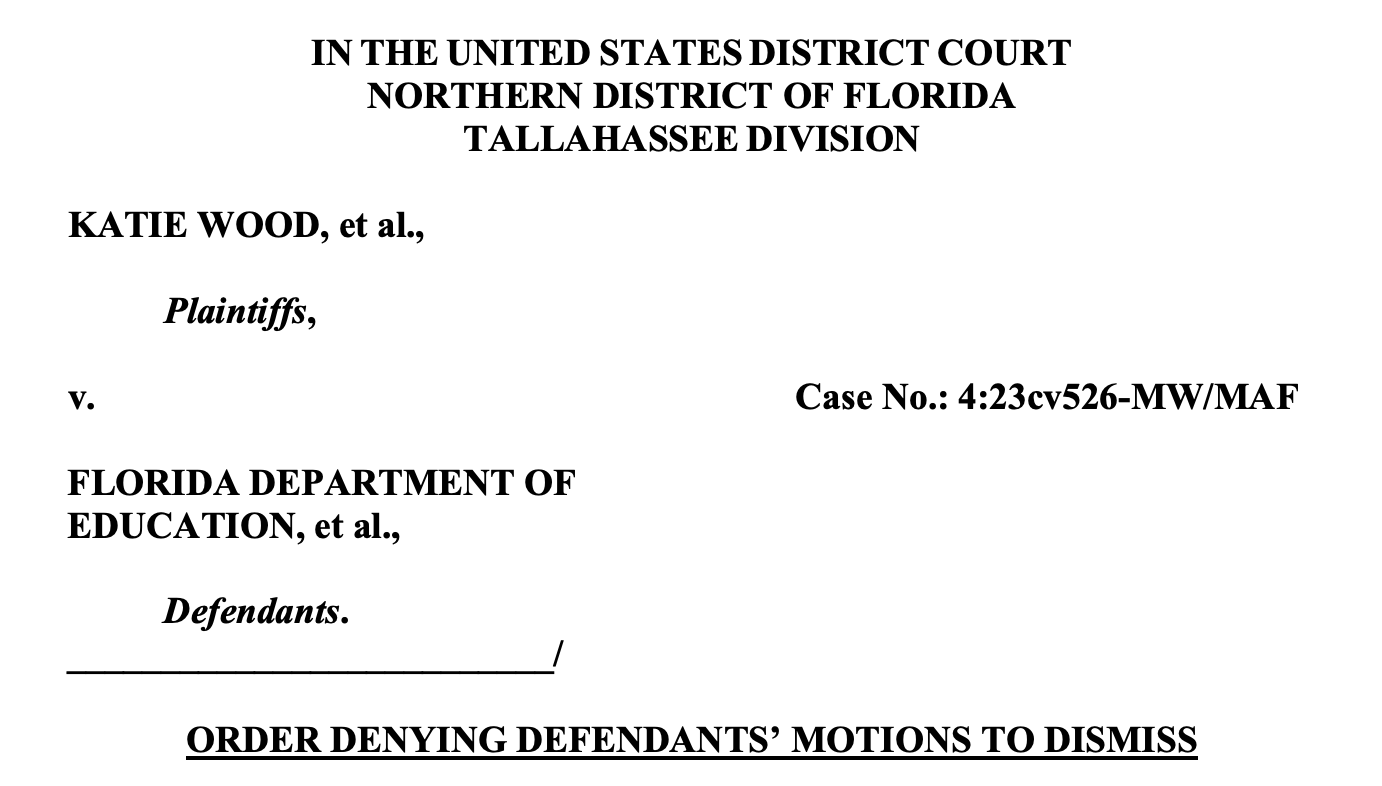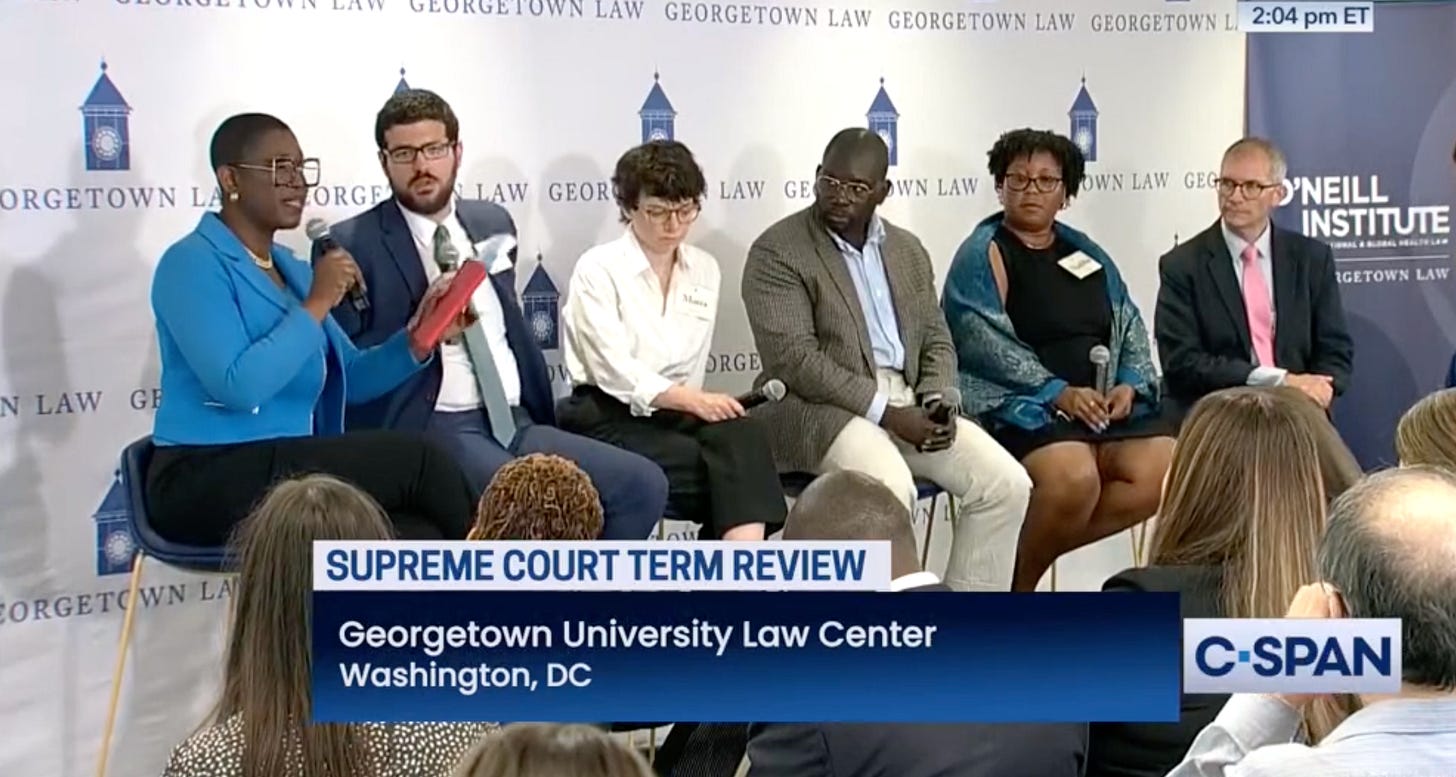Challengers score a win in fight against Florida's anti-trans classroom pronoun ban
U.S. District Judge Mark Walker allows sex discrimination claims after the Justice Department weighed in to back the teachers who sued. Also: Law Dork in the media.
A federal judge rejected Florida’s request to dismiss sex discrimination claims in a lawsuit against the state’s ban on teachers using the pronoun that corresponds to their gender identity.
In a brief order on Wednesday, U.S. District Judge Mark Walker denied motions from the state and other defendants to dismiss sex discrimination claims raised in the lawsuit under Title VII of the Civil Rights Act of 1964 and Title IX of the Education Amendments Act of 1972.
Under the anti-transgender law, teachers in the state can only use the pronouns associated with their biological sex assigned at birth in the classroom — or risk discipline that can include suspension or even licensure revocation.
Walker issued a preliminary injunction in April against enforcement of the ban as to Katie Wood, one of the teachers who sued, under a free speech claim, writing, “Once again, the State of Florida has a First Amendment problem. Of late, it has happened so frequently, some might say you can set your clock by it.”
Wednesday’s ruling expanded which claims will be allowed to go to trial.
Walker, an Obama appointee, initially allowed parts of the lawsuit to proceed as to free speech and equal protection claims, as well as a preemption claim, but agreed with the state in the April 19 order that the challengers — three current or former teachers — did not show that the pronoun ban constituted a “term or condition” of employment that could justify the sex discrimination Title VII or Title IX claims.
In a somewhat unusual moment for a federal judge, however, Walker on Wednesday reversed course — acknowledging that he got that latter part wrong the first time.
After dismissing the sex discrimination claims, the parties filed a second amended complaint to provide more information to Walker backing those claims. Additionally, the Justice Department weighed in, with a “Statement of Interest” setting forth the position of the United States on the matter — and backing the teachers’ Title VII claims.
“The mandatory nature of the title/pronoun policies and the consequences for non-compliance make clear that the policies are a term or condition of Plaintiffs’ employment,” the Justice Department lawyers wrote in the statement.
In response, Walker on Wednesday changed course.
“[U]pon review of the second amended complaint and the briefing — particularly the thoughtful analysis from the United States of America — this Court concludes that it erred when it previously held that Plaintiffs failed to sufficiently allege that the challenged pronoun policy discriminates with respect to Plaintiffs’ terms, conditions, or privileges of employment,“ he wrote.
Additionally, he further detailed the effect of a U.S. Supreme Court decision from this term, Muldrow v. St. Louis, which was issued April 17 and set forth standards for determining the “terms [or] conditions” requirement under Title VII, beyond his consideration of it in the earlier ruling. Specifically, Walker wrote, ”This Court’s incorrect analysis relied on case law that is no longer good law following” the Muldrow decision.1
Adding that he previously “oversimplified the issue” as well, Walker continued, “[T]his Court rejects its previous analysis.” He then added that he adopted the DOJ’s position wholesale, writing that he “incorporates by reference the thoughtful analysis set out in the United States of America’s Statement of Interest.”2
The ruling now allows the lawsuit against the law — with Title VII and Title IX claims, in addition to preemption, free speech, and equal protection claims — to proceed to trial.
Law Dork in the media
From the time the justices took the bench in October 2023 to the time they recessed for the summer on July 1, I brought you more than 100 reports at Law Dork on the U.S. Supreme Court; the cases they considered, granted, heard, and rejected; and the justices themselves.
On that final day of the term, I participated in Georgetown Law’s term in review panel, moderated by Michele Goodwin, the Linda D. & Timothy J. O’Neill Professor of Constitutional Law and Global Health Policy at Georgetown Law. You can watch it — and other panels from the day — here at C-SPAN.
Before that, I participated in a PBS NewsHour live chat about the Trump v. United States immunity decision. Since then, I also joined Brad Friedman to discuss that decision and others and Edwin Eisendrath on Chicago’s WCPT 820 to discuss the term.
I also was pleased to see that Scientific American, in an opinion piece from the editors about the Supreme Court’s lack of concern for facts, highlighted my work here at Law Dork:
Check it out, and thank you for your support helping to make Law Dork the go-to legal news source that it is.
This paragraph was added after initial publication, with the final edit at 5:40 p.m.
I’m not so sure that is how I would approach it, but, hey, I’m not a federal judge.








"I’m not so sure that is how I would approach it, but, hey, I’m not a federal judge."
I think one of various legal analysts, like the Strict Scrutiny gang (Stevens did call Kate Shaw a very competent law jerk), Chris Geidner, Anthony Michael Kreis, et. al., would make fine judges.
One progressive organization put Leah Litman on their list of progressive options.
Project 2025 requires teachers to use the name on your birth certificate without written permission from your parents. So if you were blessed with "Francis Wilfred" by a mother who chose it and loves the name, good luck getting called "Buck."